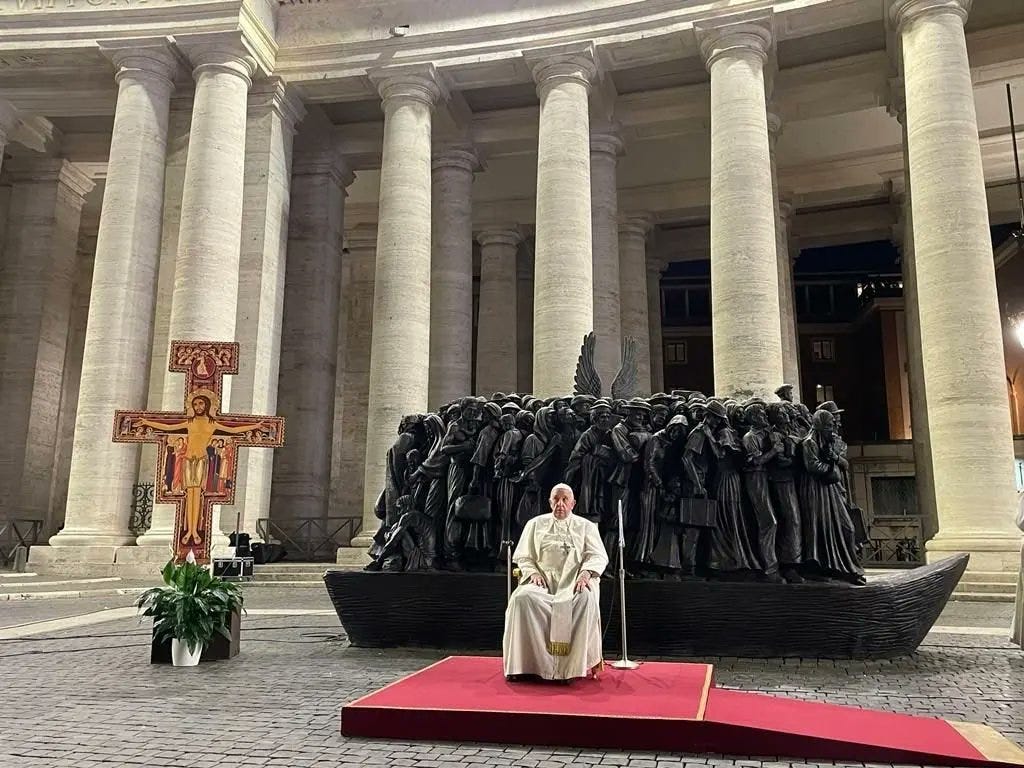The Synod Turns a Corner
The Ordination of Women, Governance and Hierarchy, and Emerging Tensions
As the ongoing Synod on Synodality began earlier this month, it was clear that the war in Ukraine weighed heavily on the participants. There were prayers for peace and even applause for those attending from Ukraine (who I also highlighted here). Now, more than halfway through the Synod proceedings, the conflict in Israel and Gaza likewise has become the background to the Synod deliberations. Pope Francis divides his time between continuing to urge peace in the Holy Land and tending to the Synod.
On Thursday, October 12, the Synod Assembly began the day with prayer for peace in the Holy Land. Later that day, at the daily press briefing for the Synod, Margaret Karram, the president of the Focolare Movement and a Synod delegate, spoke about the need for prayers for peace, particularly interreligious prayer. Karram is an Israeli of Palestinian descent who had previously worked for interreligious dialogue for the Latin Patriarchate of Jerusalem, which serves many of the region’s Palestinian Christians. The Latin Patriarch, Pierbattista Pizzaballa, only recently made a cardinal, has been outspoken in calling for peace and condemning all violence against civilians.
A week later, on Thursday, October 19, the press briefing was focused on the plight of migrants and refugees. For example, Fr. Khalil Alwan, a Maronite priest from Lebanon who coordinated the continental assembly for the Middle East region, spoke about the realities faced by refugees from the Syrian civil war living in Lebanon and the challenges imposed on Lebanese society, impacted by its own political and economic problems. Bishop Daniel Flores of Brownsville, Texas shared his experiences ministering to a population on the border of the United States and Mexico, and the efforts of Catholics in the region to meet the needs of migrants coming to the U.S. Later that evening, Pope Francis led the Synod delegates in a prayer service in St. Peter’s Square, in the presence of a statue commemorating the struggles of migrants and refugees.
Although the Synod is necessarily focused on questions regarding the community life and governance of the Church, it is clear that the process continues to be impacted by events in the world, and that the participants are focused on how the Church can respond to the world’s suffering.

The Ordination of Women to the Priesthood
No one but the most fevered Synod skeptic believes that the Synod is going to change the Church’s teaching on the ordination of women to the priesthood, but the issue was nevertheless raised at Tuesday’s press briefing, when the Australian theologian Renée Köhler-Ryan seemed to dismiss its importance. Echoing the earlier teaching of Pope John Paul II, Köhler-Ryan insisted that the equality of women in the Church can be reflected through a diversity of roles and does not necessitate ordination to the priesthood. She also argued that the question of women’s ordination, which is only a pressing concern for a few, should not overshadow the issues faced by the majority of women worldwide.
In my article on the Synod participants from Asia and Oceania, I noted that the Australian Church had engaged in an important discussion of women’s leadership in the Church, in which Köhler-Ryan played a major role, at their recent Plenary Council, and that this discussion might have an impact on the Synod:
The Synod is also set to examine how the Church can better promote the participation of women in the leadership of the Church. This issue has been a matter of debate especially in Australia. Coinciding with the ongoing worldwide synodal process, in 2022 the Australian Church held its Fifth Plenary Council, a gathering of bishops, priests, religious, and lay people, to address the challenges faced by the Church. The council participants voted to approve a motion promoting greater leadership for women in the Church, but the motion was voted down by the bishops, leading to a great deal of consternation. The proposal was revised and broken into smaller motions, all of which were then approved by the bishops.
Timothy Costelloe, S.D.B., the Archbishop of Perth and President of the Australian Bishops’ Conference, who also presided over the Plenary Council, said, “There was never any question about the commitment of everybody [to women’s leadership]. It was more a matter of what that might look like in practice.” Costelloe will be serving as one of the nine Synod presidents. On the other hand, Bishop Shane Mackinlay of Sandhurst, who will also be present at the Synod, admitted that the initial vote was a “terrible look” for the bishops. Dr. Renée Köhler-Ryan, National Head of the School of Philosophy & Theology [at the University of Notre Dame Australia] and a voting lay delegate at the Synod, was also a participant at the Australian Plenary Council who helped author the revised proposals calling for greater women’s leadership. Although not all participants at the Plenary Council shared her view, Köhler-Ryan opposes the ordination of women to the priesthood.
Keep reading with a 7-day free trial
Subscribe to Window Light to keep reading this post and get 7 days of free access to the full post archives.




